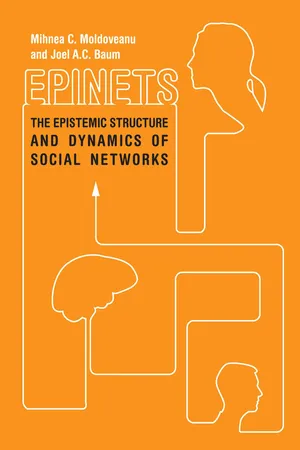
Epinets
The Epistemic Structure and Dynamics of Social Networks
- 200 pages
- English
- ePUB (mobile friendly)
- Available on iOS & Android
About this book
Epinets presents a new way to think about social networks, which focuses on the knowledge that underlies our social interactions. Guiding readers through the web of beliefs that networked individuals have about each other and probing into what others think, this book illuminates the deeper character and influence of relationships among social network participants.
Drawing on artificial intelligence, the philosophy of language, and epistemic game theory, Moldoveanu and Baum formulate a lexicon and array of conceptual tools that enable readers to explain, predict, and shape the fabric and behavior of social networks. With an innovative and strategically-minded look at the assumptions that enable and clog our networks, this book lays the groundwork for a leap forward in our understanding of human relations.
Frequently asked questions
- Essential is ideal for learners and professionals who enjoy exploring a wide range of subjects. Access the Essential Library with 800,000+ trusted titles and best-sellers across business, personal growth, and the humanities. Includes unlimited reading time and Standard Read Aloud voice.
- Complete: Perfect for advanced learners and researchers needing full, unrestricted access. Unlock 1.4M+ books across hundreds of subjects, including academic and specialized titles. The Complete Plan also includes advanced features like Premium Read Aloud and Research Assistant.
Please note we cannot support devices running on iOS 13 and Android 7 or earlier. Learn more about using the app.
Information
Table of contents
- Cover
- Copyright
- Title Page
- Advance Praise for Epinets
- Contents
- Preface
- Chapter 1. Why We Need an Epistemic Model of Social Networks
- Chapter 2. An Epistemic Description Language for Social Interactions and Networks
- Chapter 3. “What Do You Think I Think You Think about It?”: Epinets as a Tool for the Study of Network Structure
- Chapter 4. “I Think You Think I Think You’re Lying”: Trust, Secrecy, Covertness, and Authentication in Social Networks
- Chapter 5. “I Know You Think She Thinks I Trust You—But I Don’t”: Moves, Tactics, and Strategies Defined and Played in Epinets
- Chapter 6. “What You May Think We Think We Are Doing Here”: By Way of Conclusion
- Glossary
- Notes
- References
- Index